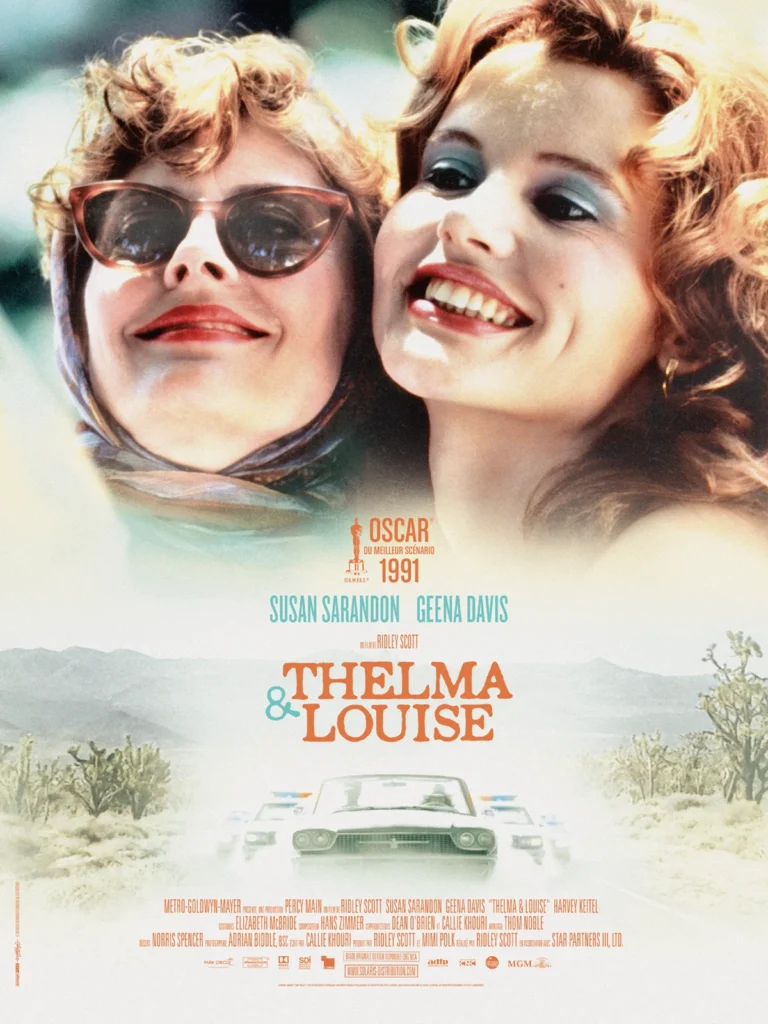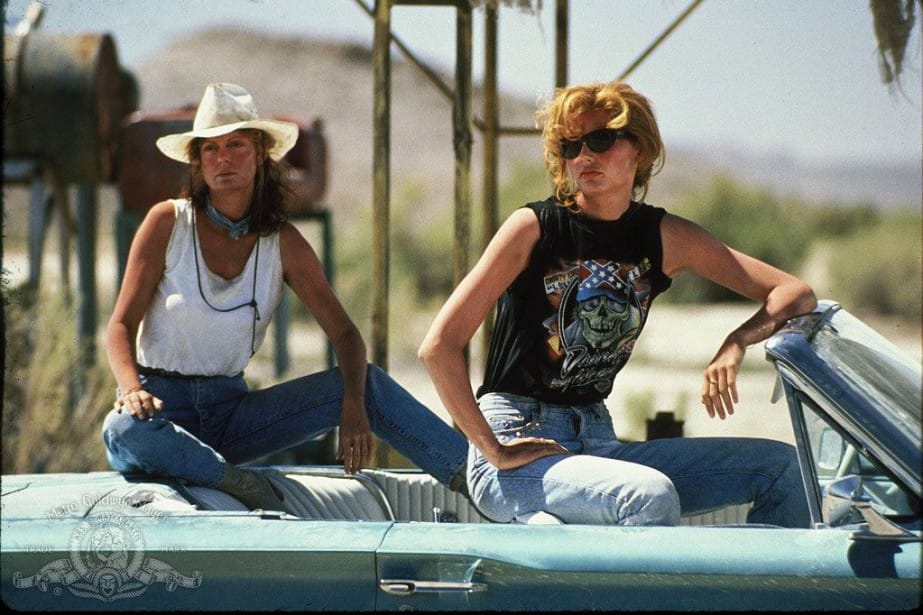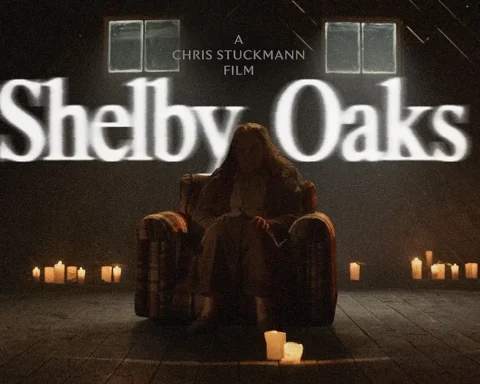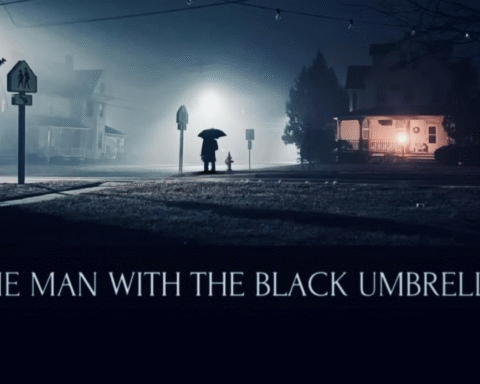‘Thelma & Louise,’ released in 1991, stands as a hallmark in cinematic history, directed by Ridley Scott and scripted by Callie Khouri. The film narrates the journey of two friends: Thelma Dickinson, portrayed by Geena Davis, and Louise Sawyer, played by Susan Sarandon. Discontent with their mundane lives, Thelma and Louise set out on what was initially planned as a weekend getaway. However, their trip takes an unforeseeable turn following a dramatic incident that propels them into a deeper voyage of self-discovery and rebellion.
The plot intricately weaves themes of female empowerment and freedom. When Louise shoots a man attempting to rape Thelma, the duo finds themselves fugitives, leading to a cross-country escape fraught with challenges and moments of triumph. The characters encounter various engrossing scenarios that underscore the broader societal commentary on gender roles and autonomy. The robust performances of Davis and Sarandon bring palpable depth to these larger-than-life characters.
The film achieved critical acclaim upon its release, becoming both a commercial success and a cultural phenomenon. Critics lauded it for its compelling narrative and strong feminist standpoint. It garnered numerous awards, including an Academy Award for Best Original Screenplay, and nominations for Best Actress for both Davis and Sarandon. The film’s visual and emotional poignance resonated with audiences, cementing its status as a classic.
‘Thelma & Louise’ also made significant contributions to the genre of road movies, presenting not only a journey through landscapes but a voyage through the evolving female psyche and spirit. Its impact on feminist cinema is undeniable, heralding a new wave of storytelling that foregrounds women’s experiences and voices in a largely male-dominated industry.
Exploration of Key Themes
“Thelma & Louise,” a movie that has earned its status as a classic, delves deeply into numerous significant themes that resonate with its audience. Central to the narrative is the theme of friendship. The bond between Thelma and Louise is depicted as unwavering and supportive, serving as a powerful testament to the strength and resilience of female relationships. Their companionship becomes a crucial pillar as they navigate the myriad challenges posed by a patriarchal society.
Another prominent theme is freedom, encapsulated by the characters’ road trip, which stands as a potent metaphor for their pursuit of autonomy. Throughout the film, both women confront and rebel against the oppressive circumstances that society has imposed upon them. The pursuit of freedom is poignantly illustrated as they break away from conventional societal expectations, seeking control over their destiny. As Thelma and Louise embark on this transformative journey, the film underscores the profound yearning for personal liberation.

Female empowerment is intricately woven into the fabric of the story. “Thelma & Louise” boldly challenges the systemic structures that subjugate women, shining a light on their struggles and resilience. The film’s portrayal of Thelma’s and Louise’s rebellion against these societal constraints becomes a broader commentary on the empowerment of women everywhere. This narrative element continues to inspire and resonate with audiences, establishing the film’s legacy as a beacon of feminist cinema.
Lastly, the portrayal of violence within the movie carries substantial weight. It underscores the extreme measures that the characters are driven to in their quest for freedom and justice. The acts of violence serve as both a real and symbolic confrontation with their oppressors, highlighting the desperation and intensity of their circumstances. The narrative thus paints a vivid picture of the harsh realities faced by women, while simultaneously conveying a message of resistance and defiance.
Cultural and Social Impact
Upon its release, “Thelma & Louise” made an indelible mark on both culture and society. The film, renowned for its gripping storyline and memorable performances, ignited a plethora of discussions about gender roles, sexism, and women’s rights. At its core, the movie reflects the struggles and resilience of women in a patriarchal society, compelling audiences to confront uncomfortable truths about gender dynamics.
One of the most potent impacts of “Thelma & Louise” was its challenge to traditional gender roles. The movie portrayed its female protagonists as complex, flawed, and ultimately powerful beings, capable of defiance and bravery. This representation was a stark contrast to the often one-dimensional female characters of previous eras, positioning Thelma and Louise as keystones in feminist film narratives. Their journey underscored issues of autonomy, liberation, and self-empowerment, inspiring conversations that extended beyond the screen.
The ending of “Thelma & Louise” sparked significant controversy and debate. The film’s conclusion, where the protagonists choose to drive off a cliff rather than submit to capture, has been the subject of extensive scrutiny. Critics and scholars have variously interpreted this act as a powerful statement of freedom and a tragic commentary on the limited avenues available to women in a male-dominated world. Regardless of interpretation, the ending solidified the movie’s status as a cultural milestone, inviting endless analysis and discussion.
The influence of “Thelma & Louise” extends to its effect on subsequent films and media. It paved the way for a new wave of movies featuring strong female leads and feminist themes, challenging Hollywood’s often male-centric narratives. Films such as “Erin Brockovich” and “Wild” can trace some of their thematic and narrative inspirations back to “Thelma & Louise,” showcasing its enduring legacy. The film also emboldened a generation of female filmmakers and writers to pursue stories that reflect the complexities of women’s experiences.
In sum, “Thelma & Louise” remains a seminal work that not only entertained but provoked critical thought and dialogue on women’s societal roles. Its cultural and social impact is both profound and far-reaching, ensuring its place as a timeless classic in cinematic history.

A Continued Powerful Relevance
More than three decades after its release, the film “Thelma & Louise” has cemented its status as a classic, continuously resonating with audiences and filmmakers alike. Its exploration of women’s empowerment and gender equality remains pertinent, fueling ongoing dialogues around these critical issues. The narrative of “Thelma & Louise” was groundbreaking for its time, presenting complex female leads who defied societal expectations and asserted their independence, a theme that retains its urgency and importance today.
The film’s iconic status is evident in its enduring influence on subsequent generations of creators and viewers. It has inspired an array of homages and references across various media platforms. For instance, the 1991 film’s climactic ending has been parodied and recreated numerous times in television shows, music videos, and other films, signifying its permeation into popular culture. Notable references include a memorable homage in the television series “The Simpsons” and the music video for Mariah Carey’s song “Honey.”
Beyond these creative nods, the themes of “Thelma & Louise” continue to inspire contemporary filmmakers who seek to craft stories centered on strong, independent women. This ongoing inspiration is reflected in a slew of modern films that echo its feminist ethos. The movie’s legacy also impacts the way female friendships are depicted on screen, portraying a bond that transcends mere companionship to embody solidarity and mutual emancipation.
Moreover, the film resonates with new audiences who encounter it for the first time. Whether it’s through digital streaming platforms or special anniversary screenings, “Thelma & Louise” remains a touchstone for discussions on gender dynamics and women’s rights. Its relevance transcends generations, ensuring that its powerful messages continue to be heard and felt. This timelessness underscores the film’s lasting impact and the vital conversations it inspires, making it an enduring classic that has not only stood the test of time but also continued to champion progressive values throughout the years.









